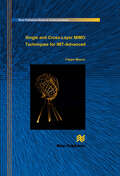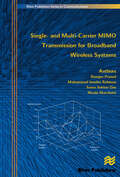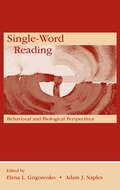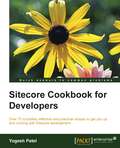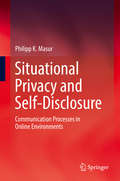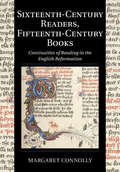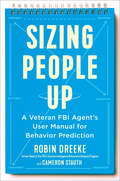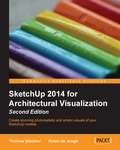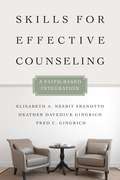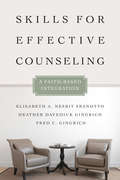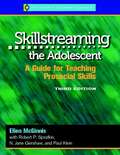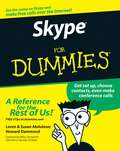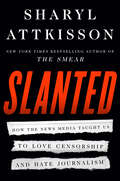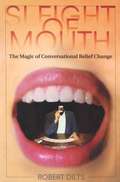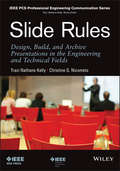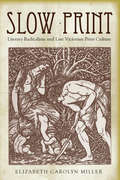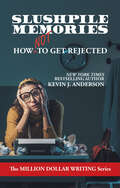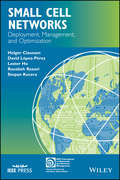- Table View
- List View
Singing and Communicating in English: A Singer's Guide to English Diction
by Kathryn LaBouffInternationally known vocal coach Kathryn LaBouff provides singers with the valuable principles of English diction they need to communicate through song. Her much sought-after technique teaches singers to practice neutral pronunciation, clarify the physiology of speech, and emphasize the study of English cadence.
Single and Cross-Layer Mimo Techniques for Imt-Advanced (River Publishers Series In Communications Ser.)
by Filippo MeucciIn the last two decades, the wireless arena has witnessed the emergence of an astonishing number of technologies which play a part in the definition of new wireless systems. Driven by the pressing capacity demand, the research community has developed several technological enablers. Fundamental technological building blocks that will be part of wireless systems in the near-future definitely include: Orthogonal Frequency Division Multiplexing (OFDM) modulation at the physical (PHY) layer, Multiple Input Multiple.Output (MIMO) systems, and a cross-layer (CL) stack design. While the benefits of OFDM have been recognized for several years, the real capacity improvement of MIMO antennae is still being debated today. As to the lastpoint, even if opportunities for CL have been pointed out for a long time, the impact on the actual legacy systems has not been noticeable, as investors are hesitant to implement the inherent design paradigm shift.Single and Cross-Layer MIMO Techniques for IMT-Advanced will present some advanced MIMO techniques where adaptivity, cross-layer approach, and MIMO antennae are analyzed together to show a deep impact on the sum-capacityachievable over the wireless link.The introduction presents the functional requirements for IMT-A candidate systems and the relation between IEEE802.16 and LTE wireless access networks. Then, in the first part, adaptive strategies are analyzedseparately at the PHY and Medium Access Control (MAC) layers. The second part presents an evolution of the previous approach, providing a cross-layer MIMO-ARQ protocol, where adaptive MIMO schemes, namely SpatialMultiplexing (SM) and STBC Alamouti, are used with ARQ protocol. A Multiple User (MU) network is served in DownLink (DL) with a Round Robin (RR) scheduler; the design is ready to include more advanced schedulers. The ARQstate machine at the MAC layer is aware of per-antenna ARQ. The interaction between the ARQ and the PHY layer, with a per-antenna ACK, allows resource exploitation to increase with per-antenna ACKs, shifting from MIMO Signal Processing Gain to MIMO Protocol Gain with no need for Channel State Information (CSI) feedback. The absence of CSI feedback at the PHY layer is an important characteristic of the proposedMIMO-ARQ cross-layer designs since MIMO CSI feedback (when feasible) drastically reduces the network efficiency.The added degrees of freedom offered by MIMO transmissions can make the difference if correctly exploited both at the physical and medium access layers, in particular for overcoming the problem of low MIMO channel ranks.The advantages of the paradigm shift from signal processing gain to protocol gain - together with the modifications to be applied at the classical protocol stack - are discussed in the final chapter.
Single- And Multi-Carrier Mimo Transmission for Broadband Wireless Systems (River Publishers Series In Information Science And Technology Ser.)
by Ramjee Prasad Muhammad Imadur Rahman Sekhar Suvra DasThe main focus of Single- and Multi-Carrier MIMO Transmission for Broadband Wireless Systems is to provide the basic understanding of the underlying techniques related to PHY-MAC design of future wireless systems. It includes basic concepts related to single- and multi-carrier transmissions together with MIMO techniques. Discussions related to different recent standards that use single- and multi-carrier transmissions are also explained.Single- and Multi-Carrier MIMO Transmission for Broadband Wireless Systems provides a comprehensive and holistic approach to the variety of technical solutions. Future system design would require these different technologies to work together, and not independently. Therefore, it is very important to analyze the effects and gains when they are put together in a unified platform. This is the prime focus of this book. Moreover, the authors include recent research results which are not yet published in another form. The book is intended to be used for lectures in graduate level courses at universities. PhD level students should also find it useful as this book will outline the fundamental concepts and design methods for PHY and MAC layers of future wireless systems. This book can also be used as a reference by engineers and developers in the industry as well as by researchers in academia. For professionals, system architects and managers who play a key role in the selection of a baseline system concept for future wireless standards, such as IMT-Advanced type architecture, the authors will include discussions, analysis and guidelines to highlight overall system level perspective.
Single-Word Reading: Behavioral and Biological Perspectives (New Directions In Communication Disorders Research Ser.)
by Elena L. Grigorenko Adam J. NaplesAs the first title in the new series, New Directions in Communication Disorders Research: Integrative Approaches, this volume discusses a unique phenomenon in cognitive science, single-word reading, which is an essential element in successful reading competence. Single-word reading is an interdisciplinary area of research that incorporates phonolog
Sir Philip Gibbs and English Journalism in War and Peace
by Martin C. KerbySir Philip Gibbs was one of the most widely read English journalists of the first half of the twentieth century. Prior to 1914 he reported on industrial unrest, Ireland, the suffragette movement, royal births, deaths and coronations, the sinking of the Titanic, and the Balkan War in 1912. This coverage of his writing offers a broad insight into British social and political developments, government and press relations, propaganda, and war reporting during the First World War. As a war correspondent on the Western Front, his articles, which appeared on both sides of the Atlantic, did much to shape civilian attitudes during the First World War and its immediate aftermath. Many critics dismissed Gibbs' work as propaganda and his acceptance of a knighthood in 1920 as a reward. His writing in the post-war years covered the full range of inter-war European politics, the Second World War, and the Cold War.
Sitecore Cookbook for Developers
by Yogesh PatelOver 70 incredibly effective and practical recipes to get you up and running with Sitecore development About This Book * Build enterprise-level rich websites quickly and deliver the best possible content management to your website * Get maximum usage of functionalities like different user interfaces, workflow, publishing, search, analytics, etc and learn different rendering techniques using presentation components for data bindings, events, handlers, schedulers, media, etc. * Add a surprising amount of functionality just by customizing the Sitecore architecture through the best practices contained in this book Who This Book Is For If you are a Sitecore developer or a programmer who wants to expand your Sitecore development skills, this book is ideal for you. You will need working knowledge of ASP.NET WebForms or MVC, as well as HTML, and a basic knowledge of Sitecore installation. What You Will Learn * Create, access, and personalize your website content using different Sitecore presentation components * Learn how to extend the presentation components to fulfill some real-life requiremnts such as improving the site's performance, generating Rss feeds and so on * Work with multiple websites on a single Sitecore instance and create multilingual websites * Customize the Sitecore interfaces as per your business requirements to provide easier and error-free user interface to content authors to save time and improve accuracy * Customize the Sitecore backend architecture as per your business needs * Automate tasks and achieve scalability by altering the development and configuration settings * Integrate external systems with Sitecore to import or export content and secure user interactions * Integrate the advanced features of analytics and personalization, to get the best possible customer experience and generate its reports In Detail This book will get you started on building rich websites, and customizing user interfaces by creating content management applications quickly. It will give you an insight into web designs and how to customize the Sitecore architecture as per your website's requirements using best practices. Packed with over 70 recipes to help you achieve and solve real-world common tasks, requirements, and the problems of content management, content delivery, and publishing instance environments. It also presents recipes on Sitecore's backend processes of customizing pipelines, creating custom event handler and media handler, setting hooks to interpret foreign language URL and more. Other topics covered include creating a workflow action, publishing sublayouts and media files, securing your environment by customizing user profiles and access rights, boosting search capabilities, optimising performance, scalability and high-availability of Sitecore instances and much more. By the end of this book, you will have be able to add virtually limitless features to your websites by developing and deploying Sitecore efficiently. Style and approach This easy-to-follow guide is full of hands-on recipes on real-world development tasks to improve your existing Sitecore system. Each topic is presented with its benefits and detailed steps to achieve it through well-explained code and images.
Situational Privacy and Self-Disclosure: Communication Processes in Online Environments
by Philipp K. MasurUsing both a theoretical argumentation and an empirical investigation, this book rationalizes the view that in order to understand people’s privacy perceptions and behaviors, a situational perspective needs to be adopted.To this end, the book is divided into three parts. Part I advances the theory of situational privacy and self-disclosure by discussing impacts of new information and communication technologies on traditional theories of privacy and self-disclosure. Based on five basic suppositions, it describes three major processes of the theory: pre-situational privacy regulations processes, situational privacy perception and self-disclosure processes, and post-situational evaluation processes. Next, Part II presents the application of the theory to smartphone-based communication. It first analyses how people choose certain communication environments on their smartphones, how they manipulate them, and how these external factors affect self-disclosure within these environments. It then details a multi-method study conducted to test the derived assumptions and discusses the obtained results. Part III reflects on the overall implications of the theory, summarizes the major findings and lastly considers possible extensions and perspectives on future research.Intended mainly for researchers in privacy and communication studies, the book offers privacy scholars a systematic review of both classic and contemporary theories of privacy and self-disclosure. At the same time, communication scholars benefit from an additional methodological discussion of the mobile experience sampling method, which provides an invaluable approach to measuring situational communication processes.
Situations and Speech Acts: Toward a Formal Semantics of Discourse (RLE: Discourse Analysis)
by David A. EvansFirst published in 1985, this book aims to develop an approach to speech acts that has the virtue of being straight-forward, explicit, formal and flexible enough to accommodate many of the more general problems of interactive verbal communication. The first chapter introduces situation semantics with the second addressing the assumptions implied by the problem of representing speaker intentionality. The third chapter presents a streamlined theory of speech acts and the fourth tests the predictions of the theory in several hypothetical discourse situations. A summary and suggestions for further research is provided in chapter five, and appendices facilitate reference to key concepts.
Sixteenth-Century Readers, Fifteenth-Century Books: Continuities of Reading in the English Reformation (Cambridge Studies in Palaeography and Codicology)
by Margaret ConnollyThis innovative study investigates the reception of medieval manuscripts over a long century, 1470–1585, spanning the reigns of Edward IV to Elizabeth I. Members of the Tudor gentry family who owned these manuscripts had properties in Willesden and professional affiliations in London. These men marked the leaves of their books with signs of use, allowing their engagement with the texts contained there to be reconstructed. Through detailed research Margaret Connolly reveals the various uses of these old books: as a repository for family records; as a place to preserve other texts of a favourite or important nature; as a source of practical information for the household; and as a professional manual for the practising lawyer. Investigation of these family owned books reveals an unexpectedly strong interest in works of the past and the continuing intellectual and domestic importance of medieval manuscripts in an age of print.
Sixth International Conference on Intelligent Computing and Applications: Proceedings of ICICA 2020 (Advances in Intelligent Systems and Computing #1369)
by Bijaya Ketan Panigrahi Swagatam Das Subhransu Sekhar DashThis book presents the peer-reviewed proceedings of the Sixth International Conference on Intelligent Computing and Applications (ICICA 2020), held at Government College of Engineering, Keonjhar, Odisha, India, during December 22–24, 2020. The book includes the latest research on advanced computational methodologies such as neural networks, fuzzy systems, evolutionary algorithms, hybrid intelligent systems, uncertain reasoning techniques, and other machine learning methods and their applications to decision-making and problem-solving in mobile and wireless communication networks.
Sizing People Up: A Veteran FBI Agent's User Manual for Behavior Prediction
by Cameron Stauth Robin DreekeA former FBI agent shares his simple but powerful toolkit for assessing who you can trust--and who you can't.After two decades as a behavior analyst in the FBI, Robin Dreeke knows a thing or two about sizing people up. He's navigated complex situations that range from handling Russian spies to navigating the internal politics at the Bureau. Through that experience, he was forced to develop a knack for reading people--their intentions, their capabilities, their desires and their fears.Dreeke's first book, It's Not All About "Me," has become a cult favorite with readers seeking to build quick rapport with others. His last book, The Code of Trust, was about how to inspire trust in others as a leader. In Sizing People Up, Dreeke shares his simple, six-step system that helps you predict anyone's future behavior based on their words, goals, patterns of action, and the situation at hand.Predicting the behavior of others is an urgent need for anyone whose work involves relationships with others, whether it's leading an organization, collaborating with a teammate, or closing a sale. But predictability is not as simple as good and evil, or truth and fiction. Allies might make a promise with every intention of keeping it, not realizing that they will be unable to do so due to some personal shortcoming. And those seeking to thwart your endeavor may not realize how reliable their malevolent tells have become.Dreeke's system is simple, but powerful. For instance, a colleague might have a strong moral code, but do they believe your relationship will be long-term? Even the most upstanding person can betray your trust if they don't see themselves tied to you or your desired result in the long term. How can you determine whether someone has both the skill and will to do what they've said they're going to do? Behaviors as subtle as how they take notes will reveal their reliability.Using this book as their manual, readers will be able to quickly and easily determine who they can trust and who they can't; who is likely to deliver on promises and who will disappoint; and when a person is vested in your success vs when they are actively plotting your demise. With this knowledge they can confidently embark on anything from a business venture to a romantic relationship to a covert operation without the stress of the unknown.
Sizzlemanship: New Tested Selling Sentences
by Elmer WheelerMore Than 2,000 Successful Selling Pitches to Command Instant Attention and Buying ActionFrom the man who sold the sizzle instead of the steak--whose best-selling books have made history both in selling and in publishing--here are the many new practical applications of his magic formula that make people buy.No matter what product or service you sell--regardless of whether you sell over the counter, through salespeople on the road, direct, or through dealers--you will find Elmer Wheeler's "Sizzle Selling" methods readily adaptable for your specific needs.This completely updated book is packed from cover to cover with scores of brilliant ideas that will show you how to discover the hidden "sizzle" in whatever you have to sell. Here you will find the actual "sizzles" that have produced phenomenal sales for scores of large and small organizations.
SketchUp 2014 for Architectural Visualization Second Edition
by Robin De Jongh Thomas BleicherBeginning with a quick start tutorial which will get you up and running with SketchUp 2014 quickly, you will move on to learning the key skills you will need to wow your clients with stunning visualizations through a series practical steps, tips and tricks. If you are a SketchUp user, from an amateur right through to an architectural technician, professional architect, or designer, this is the book for you. This book is also suitable as a companion to any architectural design or multimedia course, and is accessible to anyone who has learned the basics of SketchUp.
Skills for Effective Counseling: A Faith-Based Integration (Christian Association for Psychological Studies Books)
by Elisabeth A. Nesbit Sbanotto Heather Gingrich Fred GingrichAnyone in a helping profession—including professional counselors, spiritual directors, pastoral counselors, chaplains and others—needs to develop effective communication skills. But learning these skills is like learning a new language: it takes time and practice to communicate effectively, and lack of practice can lead to the loss of one's ability to use this new language. Suitable for both beginning students and seasoned practitioners, Skills for Effective Counseling provides a biblically integrated approach to foundational counseling skills that trains the reader to use specific microskills. These skills include perceiving, attending, validating emotion and empathic connection. Chapters include textbook features such as sample session dialogues, role plays and a variety of both in-class and out-of-class exercises and reflection activities that will engage various learning styles.
Skills for Effective Counseling: A Faith-Based Integration (Christian Association for Psychological Studies Books)
by Heather Davediuk Gingrich Fred C. Gingrich Elisabeth A. Nesbit SbanottoSkills for Effective Counselingmulticultural counselingbiblical/theological applicationscurrent and seminal research related to microskillsdiagnostic and theoretical implicationsclinical tips for using skills in "real world" counseling settingsthe relevance of specific microskills to interpersonal relationships and broader ministry settings
Skillstreaming the Adolescent: A Guide for Teaching Prosocial Skills
by Ellen McGinnisSkillstreaming the Adolescent employs a four-part training approach--modeling, role-playing, performance feedback, and generalization--to teach essential prosocial skills to adolescents. This book provides a complete description of the Skill streaming program, with instructions for teaching 50 prosocial skills.
Skype For Dummies
by Loren Abdulezer Niklas Zennstrom Howard Dammond Susan AbdulezerSee how to use Skype for secure chats and connect SkypeOut and SkypeIN. Here's the fun and easy way (r) to understand all the hype about Skype and make this cool alternative communication system work for you! You'll get great advice about hardware, directions for downloading and installing Skype, ideas for using Skype in your business, and the lowdown on making Skype calls to people with old-fashioned phones.Discover how to:Install Skype and start making callsCreate a contacts listSet up voicemail and call forwardingUse Skype for worldwide conference calls and SkypecastingEnhance Skype with Bluetooth, Wi-Fi wireless, and video
Slanted: How the News Media Taught Us to Love Censorship and Hate Journalism
by Sharyl AttkissonUSA TODAY BESTSELLER!New York Times bestselling author Sharyl Attkisson takes on the media’s misreporting on Black Lives Matter, coronavirus, Joe Biden, Silicon Valley censorship, and more.When the facts don’t fit their Narrative, the media abandons the facts, not the Narrative. Virtually every piece of information you get through the media has been massaged, shaped, curated, and manipulated before it reaches you. Some of it is censored entirely. The news can no longer be counted on to reflect all the facts. Instead of telling us what happened yesterday, they tell us what’s new in the prepackaged soap opera they’ve been calling the news.For the past four years, five-time Emmy Award–winning investigative journalist and New York Times bestselling author Sharyl Attkisson has been collecting and dissecting alarming incidents tracing the shocking devolution of what used to be the most respected news organizations on the planet. For the first time, top news executives and reporters representing every major national television news outlet—from ABC, CBS, NBC, and CNN to FOX and MSNBC—speak frankly, confiding in Attkisson about the death of the news as they once knew it. Their concern transcends partisan divides.Most frightening of all, a broad campaign in the media has convinced many Americans not only to accept but to demand censorship over journalism. It is a stroke of genius on the part of those seeking to influence public opinion: undermine public confidence in the news, then insist upon “curating” information and divining the “truth.” The thinking is done for you. They’ll decide which pesky facts shouldn’t cross your desk by declaring them false, irrelevant, debunked, unsafe, or out-of-bounds.We have reached a state of utter absurdity, where journalism schools teach students that their own, personal truth or chosen narratives matter more than reality. In Slanted, Attkisson digs into the language of propagandists, the persistence of false media narratives, the driving forces behind today's dangerous blend of facts and opinion, the abandonment of journalism ethics, and the new, Orwellian definition of what it means to report the news.
Sleepless Nights in the Procrustean Bed: Essays (I. O. Evans Studies In The Philosophy And Criticism Of Literature #No. 5)
by Harlan EllisonHarlan Ellison--master essayist, gadfly, literary myth figure, and viewer of dark portent--has been, for the greater part of his life, a burr under the saddle of complacency. In this collection, his former assistant and confidante, Marty Clark, has culled from hundreds of rare and un-reprinted works to select twenty wide-ranging essays--nonfiction writings ranging from travelogue to media criticism, literary exploration to personal musing--that demonstrate why the monstre sacre of imaginative literature won the prestigious Silver Pen award from PEN International for his journalistic forays.
Sleight of Mouth: The Magic of Conversational Belief Change
by Robert B. DiltsRobert B. Dilts has been a developer, author, and consultant in the field of Neuro-Linguistic Programming since the mid 1970's. His work has explored the practical applications of cognitive strategies and belief systems to such areas as Creativity, Learning, Health, and Leadership.
Slide Rules
by Traci Nathans-Kelly Christine G. NicometoA complete road map to creating successful technical presentations Planning a technical presentation can be tricky. Does the audience know your subject area? Will you need to translate concepts into terms they understand? What sort of visuals should you use? Will this set of bullets truly convey the information? What will your slides communicate to future users? Questions like these and countless others can overwhelm even the most savvy technical professionals. This full-color, highly visual work addresses the unique needs of technical communicators looking to break free of the bulleted slide paradigm. For those seeking to improve their presentations, the authors provide guidance on how to plan, organize, develop, and archive technical presentations. Drawing upon the latest research in cognitive science as well as years of experience teaching seasoned technical professionals, the authors cover a myriad of issues involved in the design of presentations, clearly explaining how to create slide decks that communicate critical technical information. Key features include: Innovative methods for archiving and documenting work through slides in the technical workplace Guidance on how to tailor presentations to diverse audiences, technical and nontechnical alike A plethora of color slides and visual examples illustrating various strategies and best practices Links to additional resources as well as slide examples to inspire on-the-job changes in presentation practices Slide Rules is a first-rate guide for practicing engineers, scientists, and technical specialists as well as anyone wishing to develop useful, engaging, and informative technical presentations in order to become an expert communicator. Find the authors at techartsconsulting.com or on Facebook at: SlideRulesTAC
Slow Print: Literary Radicalism and Late Victorian Print Culture
by Elizabeth Carolyn MillerThis book explores the literary culture of Britain's radical press from 1880 to 1910, a time that saw a flourishing of radical political activity as well as the emergence of a mass print industry. While Enlightenment radicals and their heirs had seen free print as an agent of revolutionary transformation, socialist, anarchist and other radicals of this later period suspected that a mass public could not exist outside the capitalist system. In response, they purposely reduced the scale of print by appealing to a small, counter-cultural audience. "Slow print," like "slow food" today, actively resisted industrial production and the commercialization of new domains of life. Drawing on under-studied periodicals and archives, this book uncovers a largely forgotten literary-political context. It looks at the extensive debate within the radical press over how to situate radical values within an evolving media ecology, debates that engaged some of the most famous writers of the era (William Morris and George Bernard Shaw), a host of lesser-known figures (theosophical socialist and birth control reformer Annie Besant, gay rights pioneer Edward Carpenter, and proto-modernist editor Alfred Orage), and countless anonymous others.
Slushpile Memories: How NOT to Get Rejected (Million Dollar Writing Series) (Million Dollar Writing Series)
by Kevin J. Anderson Kevin AndersonAvoid the mistakes that keep your manuscript unread and unpublished, from the New York Times–bestselling author. &“Dear Author, Your story does not meet our needs at this time . . .&” You know your story is good, but still it was rejected. Over and over again. What are you doing wrong? Are the odds against you? How can an author climb to the top of a pile of competing manuscripts and actually catch an editor&’s attention? By avoiding the common pitfalls and mistakes detailed in this book, you can significantly increase your manuscript&’s chances of making it out of the slush pile, and start turning those rejections into acceptances—and contracts.
Small Acts of Courage: A Legacy of Endurance and the Fight for Democracy
by Ali VelshiA captivating family history that illustrates how small actions can have an outsized political impact.Small acts of courage matter. Sometimes, they change the world. Our history books are filled with the stories of those who fought for democracy and freedom—for idealism itself—against all odds, from Mahatma Gandhi and Nelson Mandela to Rev. Martin Luther King, Jr. These iconic struggles for social change illustrate the importance of engagement and activism, and offer a template for the battles we are fighting today. But using the right words is often easier than taking action; action can be hard, and costly.More than a century ago, MSNBC host Ali Velshi’s great-grandfather sent his seven-year-old son to live at Tolstoy Farm, Gandhi’s ashram in South Africa. This difficult decision would change the trajectory of his family history forever. From childhood, Velshi’s grandfather was imbued with an ethos of public service and social justice, and a belief in absolute equality among all people—ideals that his children carried forward as they escaped apartheid, emigrating to Kenya and ultimately Canada and the United States.In Small Acts of Courage, Velshi taps into 125 years of family history to advocate for social justice as a living, breathing experience—a way of life more than an ideology. With rich detail and vivid prose, he relates the stories of regular people who made a lasting commitment to fight for change, even when success seemed impossible. This heartfelt exploration of how we can breathe new life into the principles of pluralistic democracy is an urgent call to action—for progress to be possible, we must all do whatever we can to make a difference.
Small Cell Networks: Deployment, Management, and Optimization
by Holger Claussen David Lopez-Perez Lester Ho Rouzbeh Razavi Stepan KuceraThe first and only up-to-date guide offering complete coverage of HetNets—written by top researchers and engineers in the field Small Cell Networks: Deployment, Management, and Optimization addresses key problems of the cellular network evolution towards HetNets. It focuses on the latest developments in heterogeneous and small cell networks, as well as their deployment, operation, and maintenance. It also covers the full spectrum of the topic, from academic, research, and business to the practice of HetNets in a coherent manner. Additionally, it provides complete and practical guidelines to vendors and operators interested in deploying small cells. The first comprehensive book written by well-known researchers and engineers from Nokia Bell Labs, Small Cell Networks begins with an introduction to the subject—offering chapters on capacity scaling and key requirements of future networks. It then moves on to sections on coverage and capacity optimization, and interference management. From there, the book covers mobility management, energy efficiency, and small cell deployment, ending with a section devoted to future trends and applications. The book also contains: The latest review of research outcomes on HetNets based on both theoretical analyses and network simulations Over 200 sources from 3GPP, the Small Cell Forum, journals and conference proceedings, and all prominent topics in HetNet An overview of indoor coverage techniques such as metrocells, picocells and femtocells, and their deployment and optimization Real case studies as well as innovative research results based on both simulation and measurements Detailed information on simulating heterogeneous networks as used in the examples throughout the book Given the importance of HetNets for future wireless communications, Small Cell Networks: Deployment, Management, and Optimization is sure to help decision makers as they consider the migration of services to HetNets. It will also appeal to anyone involved in information and communication technology.

